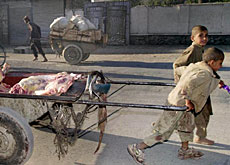
Afghanistan seeks to secure its future

One year after a United States-led coalition started its bombing campaign in Afghanistan, the country remains in ruins.
Swiss aid groups – busy helping Afghans build a future – say many of the international community’s promises to rebuild the country have yet to materialise.
This year Switzerland has committed some SFr20.8 million ($14 million) in aid to Afghanistan, mainly for basic humanitarian needs, such as food and shelter.
But concerns have now been raised about the fate of billions of dollars worth of aid that was promised by international donors in the wake of the US-led bombing.
“There is a sense of frustration,” Markus Müller, the Afghanistan coordinator of the Swiss government’s humanitarian aid agency told swissinfo.
“You speak to the Afghans and they always ask what happened to the promises that were made.”
Susanne Schneidl, head of Swisspeace’s Afghan Civil Society Forum, agrees: “We’ve raised expectations so high.
“If we ever want to learn from history, then we know if pledges don’t come then the current government will actually collapse – that’s what happened in 1992,” she warns.
Question of money
Swiss efforts in Afghanistan – a country that has been blighted by war for more than 20 years – are also being reconsidered.
The government’s Swiss Agency for Development and Cooperation has forecast a 15 per cent cut in its aid budget to SFr17.7million ($12 million) for 2003.
Around 80 per cent of this year’s budget has been spent on the provision of basic humanitarian services in Afghanistan through the World Food Programme and the UNHCR.
The remainder – around SFr1.8 million – has gone to non-governmental organisations such as relief agency Terre des Hommes, the Schaffhausen Afghanistan-Help group and the International Committee for the Red Cross.
All of these groups have won praise for their help in rebuilding schools, hospitals and homes – often in difficult and remote areas of the country.
Müller says Switzerland will have to choose what it hopes to achieve in Afghanistan.
“We still have to take care of the most vulnerable people,” he says.
“[But] we have to respond to the question of what the role is of a country like Switzerland in Afghanistan where the needs are incredible. I’ve never seen a country where everything has to be done from scratch.”
Building a civil society
Rather than trying to fix everything at once, Müller says he hopes to focus Swiss efforts on building up an Afghanistan human rights commission, and helping with efforts to draft a new national constitution ahead of general elections in 2004.
Swisspeace, which was involved with this year’s Loya Jirga that saw Hamid Karzai installed as president, is concentrating its efforts on helping create a civil society.
“There is no understanding of what the state is and what citizens are, and what they can demand from the state,” says Schneidl.
“To build a civil society takes time. We’ve lost one or two generations to war – it may take one or two generations to do it.”
Emerging from the rubble
On the surface, much appears to have changed in Afghanistan over the past 12 months.
Women are no longer obliged to wear the traditional veil, or burka, and girls are allowed to go to school.
Schneidl reports that Kabul is bustling; houses are being re-built, restaurants are opening, consumer goods are available again, and for the first time, traffic jams have started to plague the capital.
Deep-seated problems still firm
But Schneidl also worries that many of the changes are only skin deep.
“By bombing a country and changing the government, you do not change the people’s sentiment.
“More than 20 years of war have made people harder, [whereas] in some ways there used to be a very honourable culture.”
Schneidl points out that personal safety is far more of an issue than 12 months ago.
“Many bad things happened under the Taliban, but security was extremely high.”
“[Now] a lot of people see things reverting back to 1992, when the Muhajedin were fighting each other.”
Government on shaky ground
There are also problems linked to the new government, headed by Hamid Karzai – considered by some to be no more than the mayor of Kabul.
“Karzai’s government controls the countryside around Kabul, but that is more or less it,” says Müller.
“Elsewhere, the government is not present – especially in terms of providing public services like schools or education.”
The lack of government infrastructure is cited as one of the reasons why international aid is being held up.
“There is no capacity within the Afghan government to be a partner with international agencies, such as the World Bank, in operational terms,” says Müller.
swissinfo, Jacob Greber
In 2002, Switzerland committed SFr20.8 million ($14 million) in aid to Afghanistan.
In 2003, the aid budget is to be reduced by 15% to SFr17.7million ($12 million).
80% of this year’s budget has been spent on the provision of basic humanitarian services through the World Food Programme and the UNHCR.
20% has gone to non-governmental organisations.

In compliance with the JTI standards
More: SWI swissinfo.ch certified by the Journalism Trust Initiative





























You can find an overview of ongoing debates with our journalists here . Please join us!
If you want to start a conversation about a topic raised in this article or want to report factual errors, email us at english@swissinfo.ch.